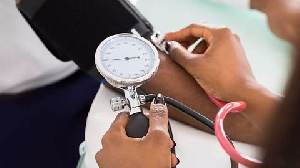- Home - News
- Polls
- Year In Review
- News Archive
- Crime & Punishment
- Politics
- Regional
- Editorial
- Health
- Ghanaians Abroad
- Tabloid
- Africa
- Religion
- Election 2020
- Coronavirus
- Photo Archives
- News Headlines
- Press Release
Health News of Thursday, 1 September 2022
Source: GNA
Prevalence of hypertension in Ghana still high, Dr. Ackaah-Gyasi bemoans
Dr. Ekow Mensah Ackaah-Gyasi, a Senior House Officer, Obstetrics and Gynecology Department at the Effia-Nkwanta Regional Hospital (ENRH), has expressed concern that the prevalence of hypertension in Ghana is still high.
He noted that the gap in hypertension prevalence between rural and urban populations is closing, especially among the elderly populations.
According to Dr. Ackaah-Gyasi, in an interview with the GNA, hypertension has become an important public health concern in the developing world owing to its rising prevalence and its adverse impact on ailing health systems.
He said despite being a modifiable risk factor for cardiovascular disease, hypertension has not received the needed attention in Ghana as a result of various competing interests for scarce health resources
He explained that hypertension, also known as High Blood Pressure, is a long-term medical condition characterized by persistently elevated blood pressure within the arteries
“The Systolic Blood Pressure (SBP) will be more than or equal to 130mmHg and Diastolic Blood Pressure (DBP) will be more than or equal to 90mmHg,” he emphasized.
The Senior House Officer mentioned risk factors of hypertension as old age, alcohol, excessive dietary intake of Sodium (Table Salt), family history, obesity, sedentary lifestyle, and stress.
Touching on signs and symptoms of the disease, he said most of the time there were no obvious symptoms but that when one started experiencing symptoms chances were that there has already been some organ damage hence, the name “Silent Killer”.
However, he enumerated some symptoms such as severe headache, blurred vision, dizziness, nausea, vomiting, fatigue, confusion, epistaxis, chest pain, shortness of breath, and irregular heartbeat.
Dr. Ackaah-Gyasi indicated that management of hypertension was mainly done in two main ways; lifestyle modification and pharmacological therapy.
He said Lifestyle Modification involved weight loss, DASH (Dietary Approaches to stop hypertension) diet, alcohol reduction or cessation, exercise, stress management, and dietary sodium reduction.
Entertainment










